REAL conversations so important to stop property scams
We need to be reinforcing verbally and consistently that we're never going to e-mail BSB and account numbers to clients, industry leader Brook Durling says – as new figures show the threat of devastating multi-million-dollar losses is growing.

EVERYONE involved in property transactions really needs to talk to stop scammers wreaking havoc for conveyancers.
That’s one of the key messages AIC WA chief executive Brook Durling has for the industry – as new figures show the threat of devastating multi-million-dollar losses is growing.
The warning comes as Scamwatch reports more than $12 million lost to false billing scams in the first five months of 2025 alone.
While not every one of the 1,261 scams involved conveyancers, the headlines tell a worrying story for the industry. One such story just last month told of a couple who lost $449,000 in a scam that impersonated a legitimate conveyancing firm.
It’s a pattern that’s becoming all too familiar, with astronomical sums vanishing.
“We have high value transactions with big chunks of cash being sent to agents from time to time to facilitate the financial settlement,” said Durling who is hearing about a steady flow of one or two a month in WA.
“It’s an attractive proposition to fraudsters and unfortunately, they’re successful every now and then, which no doubt spurs them on.”
The CEO spoke to Australian Conveyancer about the development of the crime – and offered insights on how everyone in the property buying process could help stamp out the pernicious fraud.
“If we look at the evolution of scams, it’s fascinating journey that started off with a Nigerian Prince wanting to give his money away to anyone that would listen.
“Those attempts lacked specificity and stood out. You could tell something wrong.
“But they have become smarter.
“Scammers paid attention to the language used and the way of building trust. It’s almost like grooming.
“They don’t ask for money in the first e-mail but wait until the 5th.
“Artificial Intelligence is clearly being used. When one or two of these pay off, they will have a few hundred thousand dollars.
“That’s a huge funding injection for some of these operators. That means the evolution of their messaging can get even better.”
The tactics of who the criminals target has also evolved where the customer is hacked instead of the real estate agent or settlement agent, he explained.
Fraudsters create email accounts pretending to be from the agent, slightly amending a minor detail, such as taking off an S at the end of a business name.
They may also get a quote from the business so they can get a screenshot to use to spoof that business. And the fact the criminals can change account details in a PDF is a recipe for disaster, says Durling.
“What’s worrying is how are they getting the customer information? Have they hacked the conveyancer, the real estate agent, the broker? Someone in the chain has been compromised.
“It can be the settlement agent, the mortgage broker, the receptionist in the mortgage broker that clicks the link and doesn’t know.
“The fact is that technology has enabled criminals to go after the general public. They use bots to look for keywords, deposit, property transaction, on compromised emails.
“They then work like a marketing department, filtering leads to go after those who are involved in a property transaction.
“They are waiting for a profile to get past a threshold that says something is happening here worth us monitoring.”
Everyone must be super vigilant
“Where my concern lies is that every single person in this value chain has an obligation and a responsibility to be super vigilant.
“That applies to the buyer, seller, conveyancer, the bank, mortgage broker and real estate agent.
“It used to be your technology that protected you. Now it’s not about technology, it’s about behaviour.
“It’s the people part that’s the issue. You can have the best systems, but that chain is only as strong as its weakest link.”
Talking about those people who use free Wi-Fi, he warned: “Be aware your stuff might not be as safe as you think.
“If you’re going to e-mail account details to a business to pay money, pick up the phone and call them to validate those things over the phone.
“Or better yet, don’t use e-mail, use something different.
“That’s what we are telling our members as part of their mandatory professional development.”
The mindset has changed from a once-a-year exercise to making it part of the culture and part of the conversation all the time, he says.
“An e-mail signature that says we will never send you account details via e-mail is important.
“But it becomes noise.
“We need to be reinforcing verbally and consistently this messaging that we’re never going to e-mail you BSB account numbers to clients
“I really don’t care if a phone call to confirm a BSB and account number is inconvenient.
“The magnitude of what can happen is far greater. It can be catastrophic.”
“The consequences can dire – like PTSD.
“At the same time, those who are compromised could still have 20 settlements due the following week and now have to juggle dealing with the fraud issue and managing normal business operations – a recipe for bad mental wellbeing.
“Whilst the financial cost of fraud is enormous and undeniably serious, we must also acknowledge the hidden toll – the stress, anxiety, and disruption it inflicts on the people it touches.
“The old adage, ‘prevention is better than cure’, has never been more relevant.”






